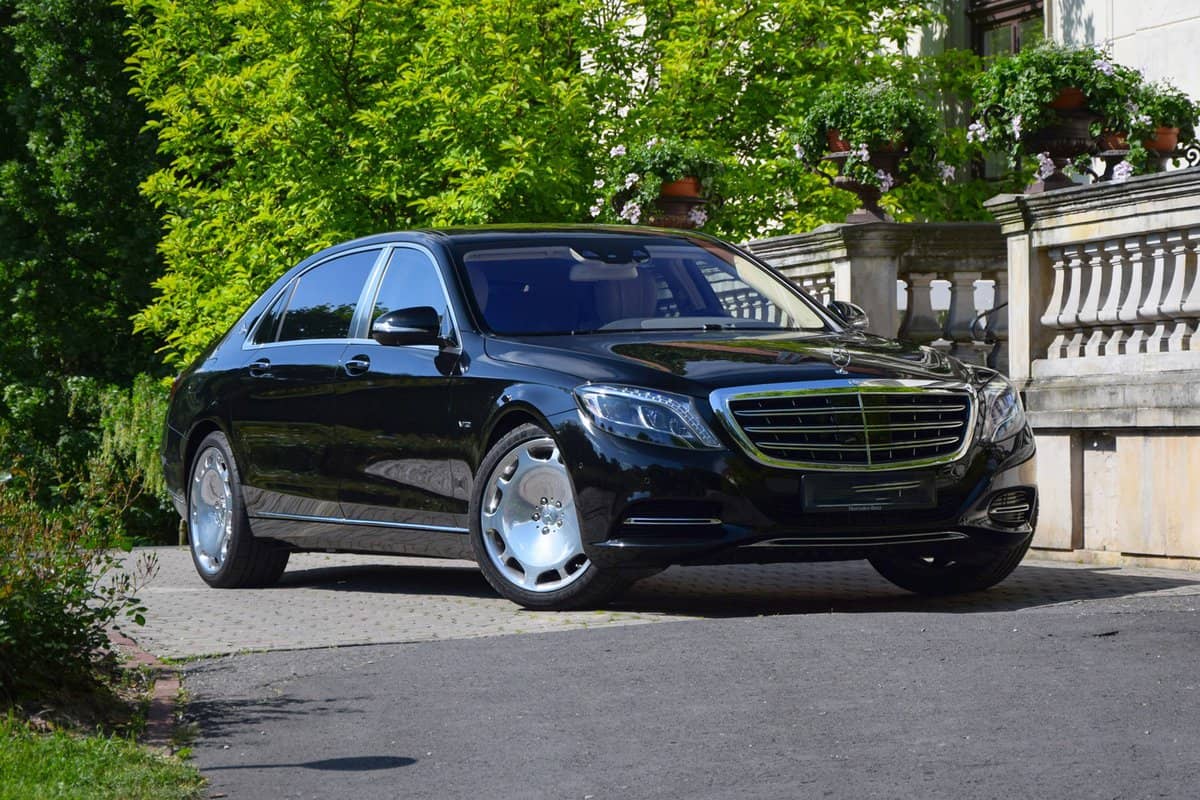If you're in the market for a Mercedes Benz, one question that will most likely pop up in your mind is how many miles will this car last? And how many years will I get out of my purchase? Don't worry, because we've diligently searched trustworthy sites to give you the answer.
Most Mercedes Benz cars have an average lifespan of anywhere from 150,000 to 250,000 miles with routine maintenance and prudent driving. This translates to 15 to 17 years if your mileage conforms to the national average of 15,000 per year.
These luxury cars of German origin have a long-standing reputation for quality and durability. They also come in various types and models, and each one may have slightly different mileage capacities. We've looked into the more popular models, so if you want to learn more about a specific car, including tips and info, read on.

How Many Miles Can A Mercedes Benz Last?
The 150,000 - 250,000 miles given for a Mercedes to last is a conservative estimate. It is also longer than the lifespan of most automobile brands.
A 1976 Mercedes Benz 240D driven by a Greek taxi driver had 1,770,907 miles on its odometer. The manufacturer asked him to donate it to the Mercedes Museum in exchange for a C 200 CDI.
On discussion sites Quora, Reddit, and Mercedes forums, a good number of these cars have gone well over the 250,000-mile lifespan. The E-Class range is purported to have maximum longevity, while the C-Class has the shortest life.
But it's not all peachy in the world of Mercedes Benz. Despite the superb craftsmanship and meticulous construction, the car manufacturer has to deal with problems that keep coming up. Forewarned is forearmed, so we're listing some of them.
How Many Miles Can You Expect A Mercedes Benz (By Model) To Last?

Mercedes Benz models have slight differences in the number of miles they are expected to last before an engine rebuild is necessary.
Here's a breakdown by a model of the number of miles you can expect a Mercedes Benz car to last if driven at 15,000 miles per year, which is the national average mileage of a car per year.
How Many Miles Can You Expect From A Mercedes C-Class?
The Mercedes C-Class currently comes in sedan, coupe, and cabriolet types. They have an average longevity of 150,000 to 200,000 miles or about 10 to 13-17 years.
The 2022 C-Class car is seeing a significant change in its engine. All models, including the AMG, will be fitted with 2.0 L turbocharged four-cylinder engines, unlike previous models that gave you a choice of V6 or V8 engines.
The sedan, coupe, and cabriolet are available in C 300 (rear-wheel drive,) C 300 4MATIC (all-wheel drive), and the AMG C 43 for the coupe and cabriolet only.
How Many Miles Can You Expect From A Mercedes S-Class?

The Mercedes Benz S-Class is the flagship vehicle of the company. It's a top-of-the-line full-size sedan that puts a premium on luxury, comfort, and performance. It is known to last longer and can run 200,000 to 250,000 miles, or 15 to 25 years.
The 2022 S-Class sedan comes in these configurations:
S 500 4MATIC (3.0l inline six cylinders)
S 580 4MATIC (4. Ol v8)
Maybach S-Class 580 4MATIC
Maybach S-Class 680 4MATIC (handcrafted 6.0L V12)
The latest generation has discontinued the S-Class coupe and convertible.
How Many Miles Can You Expect From A Mercedes E-Class?
The mid-sized luxury Mercedes Benz E-Class is expected to have a longer lifespan of 200,000 to 250,000 miles or 17 years compared to the C-Class.
The 2022 E-Class has E350, E450, and AMG E 53 models. The E350 has 2.0L four-turbo cylinders, while the E450 and E 53 come with 3.0L six-turbo cylinders.
The E-Class is priced more than the basic A-Class and the more popular C-Class.
How Many Miles Can You Expect From A Mercedes A Class?
The Mercedes A-Class is relatively new in the U.S., launching only in 2018. It is expected to last 200,000 to 250,000 miles, or 13 to 17 years, if based on the European A-Class cars that have been on the road since the 1990s.
It is the company's basic-level sedan with a 2.0L inline 4-turbo engine. Although it has a lifespan that equals most Mercedes cars, a 100,000 mileage of this class is already considered high.
At this point, the value drops, and repairs are not economical. Regular maintenance and taking good care of the car will prolong its life.
How Many Miles Can You Expect From A Mercedes Diesel Engine?
The 2022 Mercedes Benz G 400d, more popularly known as the G-Wagen, is the company's SUV with a diesel engine.
These cars are expected to last 500,000 miles or more than 20 years. They are specially made to handle rough terrain and are big on durability.
Unfortunately, Mercedes cars with diesel engines are not available in the U.S.
Common Issues You Might Encounter In A Mercedes Benz

Engine Misfire
When your car slows down, loses power for no reason, or shakes when you drive faster, it could be due to an engine misfiring. This happens when a cylinder does not give enough fuel to the engine.
A common cause of Mercedes cars being more sensitive to misfires is worn-out spark plugs. While other car brands have four spark plugs (one for each cylinder,) most Mercedes models need six or twelve for their six-cylinder engine cars. Hence, owners often neglect to change their spark plugs, triggering a misfire.
Oil And Differential Leaks
Mercedes Benz cars with high mileage are often prone to oil and differential leaks due to deterioration of the differential cover, pinion, and axle seals. Since owners of these cars often keep them for longer times than other brands, they are more likely to experience these leaks.
Prone To Rust
Mercedes models manufactured in the 1990s to 2000s were known to rust more quickly than other brands. The theories behind this issue are twofold: the company resorted to cost-cutting and used thinner steel, and it switched to water-based paints and reduced the layers of paint on the cars.
How To Prolong The Life Of Your Mercedes Benz

Although the average Mercedes Benz can go for hundreds of thousands of miles, several owners claim to have driven past the one million-kilometer mark on their Mercedes cars. Regular checkups, immediate attention to minor issues, and sound driving habits add life to your car.
It's in your best interest to take special care of your Mercedes Benz. You paid good money for it, and given the proper care and maintenance, you can expect it to last for many years longer than the average car life in the United States.
Here are ways to make your car last:
Keep your car covered outside and inside the garage.
The elements of nature can affect your car's exterior. Rain that falls on your car contains pollutants, hail can create small dents, and prolonged exposure to sunlight can make your car's paint dull or faded.
Inside the garage, dust can settle on the sides, hood, and back. If you use improper wiping methods, you can create scratches on the car paint.
Get this Kayme universal fit car cover on Amazon.
Wash your car regularly
You should wash your car twice a month, and after it has been exposed to salt air or heavy dust. Be sure to wash the undercarriage, especially if the car has gone through mud or snow. If you don't wash your car regularly, the buildup of dust and dirt can lead to corrosion that results in rust.
Wax the car every six months to maintain your car's sheen. Do not neglect cleaning the car's interior. Make sure to use quality, recommended car-care products.
Get Meguiar's Gold Wash on Amazon.
Check the tires
Give the tires a routine check for uneven wear and tear. Rotate the wheels front to rear every 5,000 to 7,000 miles if your Mercedes is a rear-wheel drive and 3,000 to 5,000 miles if it's an all-wheel drive.
Check the tire pressure of all four tires early in the morning before you drive. Know what psi is recommended for each wheel and check the actual psi of your car's tires in the tire monitoring system on the dashboard.
Get this AstroAI Portable Air Pump on Amazon.
Get the transmission serviced
Have the transmission serviced when your car reaches 80,000 miles. Transmission service for Mercedes Benz cars includes flushing out the transmission fluid and replacing it with new fluids at the 80,000-mile mark.
The filter, sump pump, pan, and pan gasket must also be cleaned or replaced. Since almost all Mercedes have automatic transmissions, automatic transmission fluids should be used on them.
Adhere to the service maintenance schedule
Service A is due when your car is one year old or has reached 10,000 miles, whichever comes first.
Service B is due after two years or when the car reaches 20,000 miles, whichever comes first.
Service A and B include the following:
-
-
- Synthetic motor oil and oil filter replacement
- All fluid level checks and corrections
- Tire inflation check and correction
- Brake component inspection
- Reset maintenance counter
-
In addition, Service B has:
-
-
- Cabin dust/combination filter replacement
- Brake fluid exchange
- Compliance with all requirements by model, year, and specific model
-
In Closing
Now that you know what the lifespan of the average Mercedes Benz car is, you can make a wiser decision on what brand and model of a luxury car to buy, taking into consideration the initial and maintenance costs.
You may also be interested in these articles:
Can An Engine Misfire Fix Itself?



